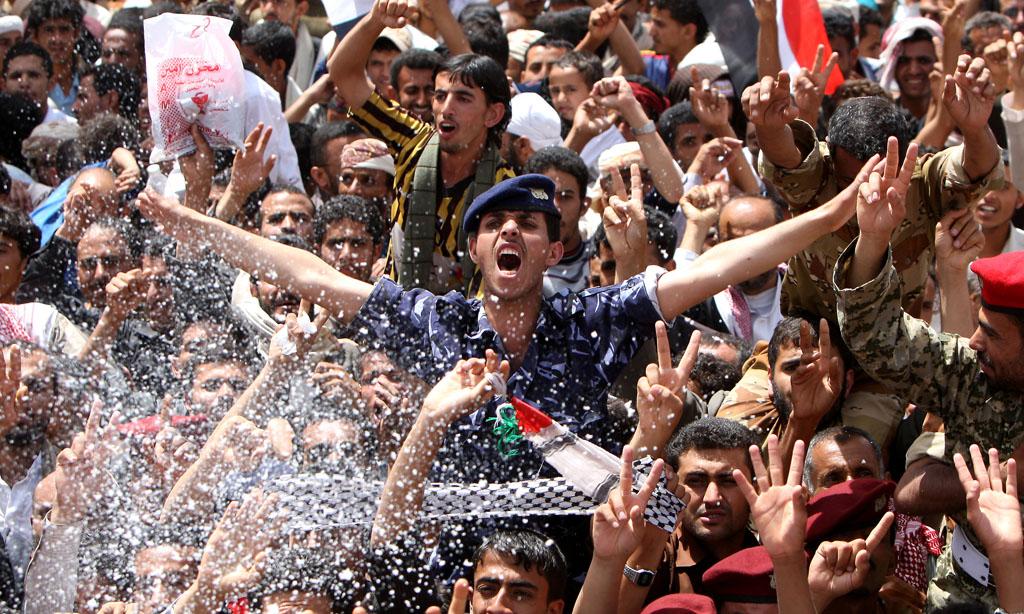Celebrations in Yemen tempered by rumors of Saleh’s return
Yemeni protesters continued to celebrate President Saleh’s departure on June 5, 2011, though rumors that the president intended to return in a matter of days once he had recovered left many skeptical.
SANAA, Yemen — As news of President Ali Abdullah Saleh’s departure first reached Change Square in Sanaa, a raucous applause went up, followed by a round of fireworks just as dusk fell.
But even as celebrations continued, residents and protest leaders weren’t convinced that Saleh’s departure was the end of violence.
The continuation of shelling and rumors that the president intended to return from Saudi Arabia after recovering from wounds he suffered in an attack on his palace on Friday, tempered the mood for many protesters. Meanwhile, analysts, warn of a deadly power vacuum in the months ahead.
“Yemen is reborn,” screamed thousands of protesters who have lived in front of Sanaa University for more than four months, weathering tear gas and AK-47 fire in their efforts to force the autocrat from power after 33 years. Hundreds have died in clashes with state forces.
Along with the dancing and singing, several cows were slaughtered, grilled and distributed to the joyous protesters for a celebratory feast across the camp.
However, as protesters rejoice, military checkpoints still dot the capital. These soldiers are under the command of Saleh’s eldest nephew, Yahya Saleh, who remains in the country. Saleh’s eldest son Ahmed, in command of the Republican Guard, still remains in the country as well.
As soon as news of Saleh’s departure began to spread, both Yahya and Ahmed ordered their men to re-engage with armed rebel tribesmen in the northern Hasaba district of Sanaa.
The celebratory boom of fireworks mixed with the deathly roar of artillery, as shells rained down from surrounding mountains and into the city for the 11th night in a row.
The shelling continued through the night and into Sunday morning, with the occasional burst of heavy machine fire as soldiers shot at cars attempting to burst through checkpoints.
Some may have been taking weapons and munitions to the tribesmen in Hasaba and some may have simply not been paying attention to signals to stop their car.
As protesters' continued their celebrations into Sunday afternoon, news reached Sanaa that Saleh intends to return to the capital in a matter of days once he has recovered from his medical treatment, a Saudi government source told Reuters.
In response, Mohammed Qahtan, spokesman for Yemen’s political opposition party bloc, vowed that they would do everything in their power to keep Saleh from re-entering the country.
“If Saleh comes back, there will be thousands of us at the airport to receive him,” said Marwan No’man a Change Square resident who has vowed to remain in camp until a new government is in place.
Many of Yemen’s protest leaders enjoyed Saleh’s departure with a tempered sense of suspicion, uncertain what the future may bring or if Saleh would return.
“I’m happy but I’m still suspicious,” said protest organizer Adel Al-Surabi, who has lived in Change Square since the first tent spike was driven into the concrete in February.
“I hope he doesn’t come back. Maybe he isn’t well enough to. But one thing is for sure — should he return, he’s going to take revenge for the attempt made on his life,” he added.
The rest of Sanaa’s residents don’t share the protesters confidence or their belief that the conflict may be coming to an end.
As dawn broke over the city, more families piled furniture on the tops of cars, strapped down by rope, before fleeing the city to their rural tribal areas. Others who remain say they are doing so only because they fear their homes will be looted should they flee.
“I’m taking my family out of the city but I have to come back and protect my home. If everything breaks down, they will try and take everything,” said Abdul Mughni al-Ansi as he ushered his three small children into his cab, packed full with suitcases.
